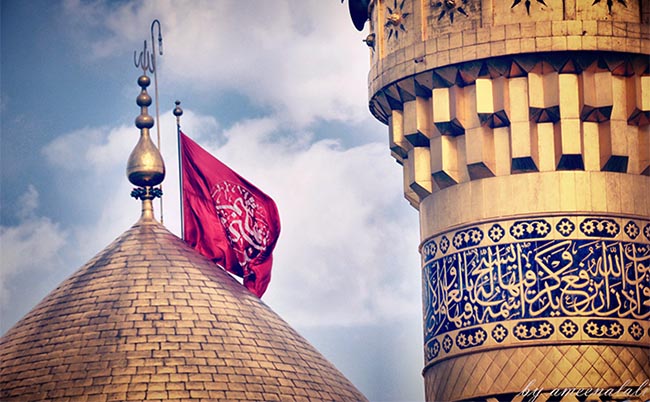The Holy Month of Muharram is celebrated annually as a religious ritual in Islamic societies to commemorate the martyrdom of Imam Husain (A.S) – the grandson of Prophet Muhammad (PBUH) – and his devoted companions who embraced death to free themselves from the chain of slavery. Their blood was spilt in the burning desert of Karbala, a city in Iraq, about fourteen centuries ago when they refused to pledge allegiance to the corrupt regime of Yazid.
Succeeding his father as self-styled caliph, Yazid urged Imam Husain (A.S) either to pledge loyalty to his caliphate or will lose his life. Imam Husain (A.S) said that a glorious death was far more honorable than an inglorious life. He protested against the Yazidi regime and believed that one who pledged allegiance to a cruel king; s/he would be responsible for all the harms and misdeeds perpetrated by the regime. The Yazid’s regime was infamous for violating the Islamic tenets – established by the Prophet Muhammad (PBUH) within 23 years. The Prophet appeared like a guardian angel in the Arab Peninsula when the people were deep in inhumanity, moral corruption, violence and bloodshed. For instance, giving birth to a daughter was a disdain and women had no rights and liberty. Tribal structure, superstitions and wrong traditions held strong sway and no one dared talk against them. The system of slavery was prevailing and women were treated no more than a slave. Human rights and dignity were ignored and only the aristocrats were held in respect. Prophet Muhammad (PBUH) emerged to humanize the society through fighting wrong traditions and establishing a school of humanity, in which the individuals’ dignity and their rights to life, liberty and property were respected and protected, women were not treated as inferior creature, the one with greater virtue was introduced a godly person irrespective of his/her race, color or caste. He established a code of life replete with humanity, virtue and moral values. He suffered severely and encountered countless challenges in ameliorating the wrong traditions and fighting moral turpitude. Following his sad demise, however, many caliphs controlled the society and sought to continue peace and brotherhood the same as Prophet (PBUH) did. When Yazid inherited the throne – though he was neither supposed to come to the throne nor deserved it – he trampled upon the religious sharia and deviated from the right path. Therefore, Imam Husain (A.S) revolted against his dictatorial and corrupt regime.
Imam Husain (A.S) believed that if Yazid was to rule the society, the school of his grandfather, Prophet Muhammad (PBUH), would be disintegrated and the Islamic tenets would be metamorphosed and introduced wrongly to the next generation – as they have been done so presently.
Feeling the threat posed to Islamic tenets by the Yazid’s regime, Imam Husain (A.S) departed to Kofa but stopped by Yazid’s men in Karbala. He was said to pledge loyalty or would be killed there. Imam Husain (A.S) was along with his family and companions – brought them to portray a heroic revolution and color it with the blood of close members of his family and devoted men. His sister accompanied him to pronounce his epic revolution to the world and let his blood oozes from the heart of history every year around the globe, mainly in Islamic societies, to send the message of freedom and bravery. Subsequently, Imam Husain (A.S) denied to accept the cruel regime and resorted to sword despite knowing that he would be killed since thousands of people stood against his small caravan.
Imam Husain (A.S) said that the reason behind his revolution was to revive the Islamic Sharia and Prophet’s Sunnah. He led the revolution to uphold the rights and dignity of mankind and revitalize the ethical code which was moribund. He was aware of the fact that if he shook hands with Yazid, he would be condemned by the history and if he denied it, his revolution would teach the lesson of humanity, heroism, and liberty to the world.
Consequently, his and his companion’s blood was spilt in the blazing desert of Karbala without an iota of mercy. His death, however, enlivened his personality and human characteristics and he was known as hero, by history, who fought against the real villain. History witnesses the deathless soul of Imam Husain (A.S) and the victory of his blood over sword. The messages of his revolution are to choose a manly and honorable life and let your soul never succumb to your physical needs, desires and lusts. In a nutshell, he sacrificed his life to protect humanity and divine messages and to protest against any evil and devils. He preferred an honorable death to a dishonorable life as he said, “The glorious death is far more honorable than inglorious life.”
Mahatma Gandhi about Imam Hussain (A.S) said that “I learnt from Hussain how to achieve victory while being oppressed.” He also said that “If India wants to be a successful country, it must follow in the footsteps of Imam Hussain (A.S).
English historian and member of parliament, Edward Gibbon, said about Imam Hussain (A.S) that "In a distant age and climate the tragic scene of the death of Hussain will awaken the sympathy of the coldest reader."
Now, it is the Muslim Ummah not to only mourn over the tragic aspect of Karbala’s revolution but also learn the lesson of humanity and free themselves from evil, fight against corruption and moral turpitude and raise their voice against cruelty. Moreover, they will have to respect the rights and dignity of mankind and revolt against carnage and insurgency. Since this holy revolution has transcended the historical and geographical limitations, it is hoped that it will implant a strong sense of humanity around the globe, mainly in Islamic societies.
Home » Opinion » The Revolution of Karbala
The Revolution of Karbala
| Hujjatullah Zia

